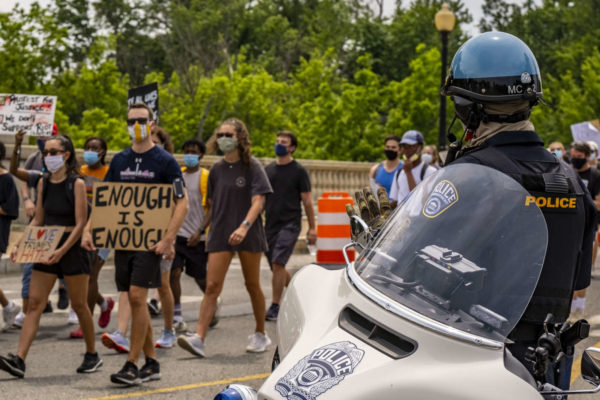(Updated at 4:q0 p.m.) After weeks of protests in Arlington and around the world, the association that represents Arlington police officers is weighing in on calls for police reform.
While arguing that ACPD is one of the most educated and well-trained police forces around, the association says that some changes may make sense. Defunding the department, however, could result in lower-quality policing, they say.
“Our officers in Arlington County are well-educated, highly trained, thoughtful men and women,” Arlington Coalition of Police President Scott Wanek said in an interview with ARLnow last week. “They’ve been delivering high-quality police services to the Arlington community for decades.”
As police departments around the country are scrutinized for excessive use of force, and as outrage over police killings boils over, the message from the association is: ACPD is different.
In Arlington, entry-level officers with no prior police or military experience are required to have completed 60 semester hours at an accredited college or university. Most officers have bachelor degrees and many have post-graduate degrees, according to Wanek.
That level of education, and the extensive training that Arlington officers receive, set the department apart.
“At every stop in [field officer training] de-escalation is taught. We have implicit bias training. We teach exhaustive conflict communications training, to include 75% of our officers are certified in our [Crisis Intervention Team] program… for mental health crisis situations,” said Wanek. “A lot of training goes in to our officers.”
Out of about 118,000 police-citizen interactions in 2019, Wanek said, there were 67 uses of force.
“Our goal is to do what we can to reduce it even further, that’s always a worthwhile endeavor,” he said, “especially since in about 40% of the cases our officers sustain injuries in interactions where they’re required to use force.”
Asked about a rising rate of complaints about ACPD officers in 2019, Wanek said some of that is attributable to changes in the way such data is recorded. He pointed out that most of the complaints were generated within the department.
“We don’t just stand idly by,” said Wanek. “That’s not in our culture.”
As for the now-infamous deployment of riot-clad ACPD officers near the White House — the squad was removed after being ordered to clear peaceful protesters away from a presidential photo op — Wanek defended the officers involved.
“In retrospect, it’s unfortunate that we were put in that position,” he said. The officers “behaved well, didn’t violate any policy, procedure, or laws. We certainly didn’t appreciate the optics we got, and we’re looking to move forward, collaborate with the community, and be a voice in the discussion of how we’re going to change law enforcement and the criminal justice system.”
“The residents of Arlington have a right and a responsibility to decide how they’re policed,” Wanek continued. “That’s where the faith in our badges come from. We can’t effectively enforce the laws of the Commonwealth if the community doesn’t believe in us.”
In terms of proposed reforms, Arlington officers are “clearly in support of any reasonable idea that leads to reduced use of force and officer injuries,” according to Wanek. That includes the forthcoming use of body cameras.
“We support the use of body cameras,” Wanek said. “Our officers are thoughtful, well-educated, competent… our feeling is that if you put cameras on them it’s going to show more of that.”
“Cameras tend to exonerate officers more often than not,” he added. “More importantly… the presence of the camera can play a role in an offender deciding not to assault an officer, eliminating the need for use of force altogether.”
While Arlington officers are trained to respond to mental health crises, Wanek said the calls of some police reform advocates for alternatives to law enforcement intervention in mental health issues and homelessness is “a phenomenal idea.”
“There are two easily achievable reforms… ending police response to nonviolent mental health crises and homeless person calls,” Wanek said. “I reject the notion that injecting an armed police officer in incidents of a mental health crisis… is a solution, it’s not.”
If police reform means “divesting the police from certain unrealistic, historical obligations, then so be it,” he said, adding that there are also some “civil matters and things that aren’t criminal” to which police are dispatched that should be reevaluated.
As for the calls of some to defund the police — a newly-formed group wants ACPD’s $74 million budget cut by “at least 10%” — Wanek said “that’s up to the citizens of Arlington, and to the [County] Board.”
He noted that officers don’t have collective bargaining rights in Virginia and “thus don’t have power in local politics, other than to ask nicely for things.” But cutting the budget could have the opposite effect that reform advocates want, he suggested.
“My fear is that if you cut the budget by a substantial enough… it’s going to affect our ability to attract the people that we have historically attracted to our department and who have historically done a really good job,” he said. “That would be a shame.”


